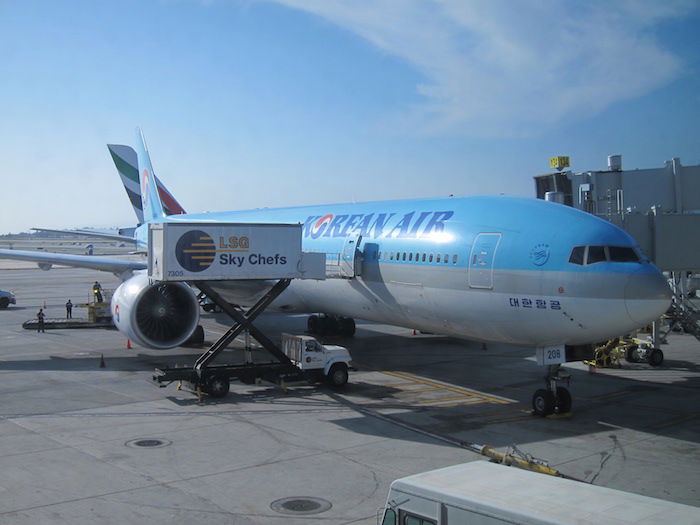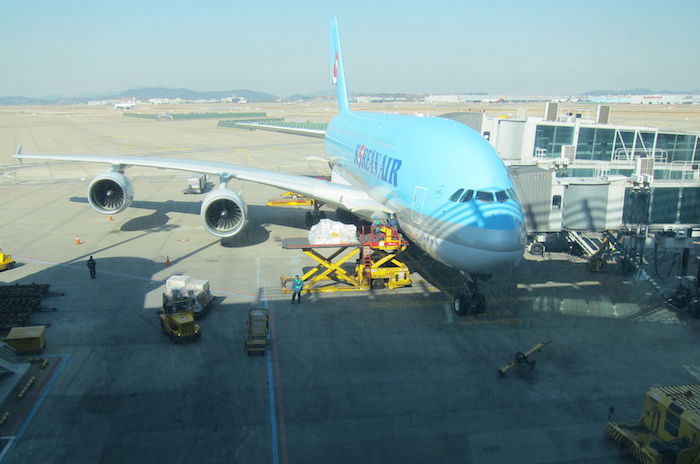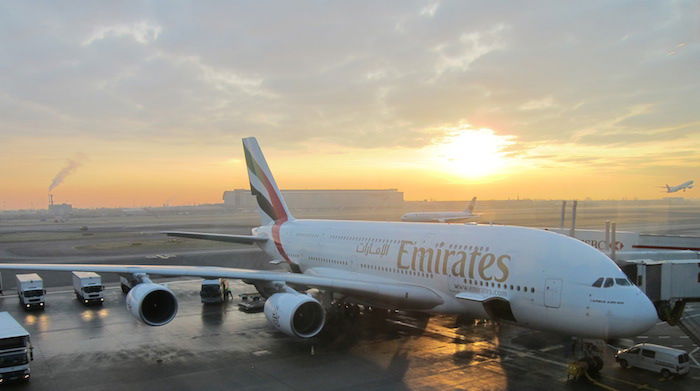While strikes are monthly occurrences at Lufthansa (sometimes even more often), they’re less common at airlines in Asia. At least for the pilots. Well, it looks like a pilot strike could be on the horizon at Korean Air, as management and the unions are in a huge disagreement over potential pay raises.

Through January 29, the airline’s two pilot unions will be voting on management’s proposed 1.9% pay raise for pilots. The union isn’t happy with this proposal, so I’m guessing it will be voted down. The pilots want a 37% pay raise, citing that they haven’t received big increases lately. This is despite the fact that Korean Air is believed to have lost money in 2015.
Via The Korean Herald:
The labor problem at Korean Air, however, is drawing keen attention from the public as the pilot have demanded a 37 percent raise, the highest level among conglomerates.
“Our demand is legitimate as the company froze or inched up the pay increase rate over the past few years,” Seo said. According to the unions, the paycheck of pilots was flat in 2013 and rose 3.2 percent in 2014.
Management isn’t down with this, of course, citing that they’re losing money and need to cut costs due to the global competition from airlines in China and the Middle East.
Ironically, the pilots are citing those same airlines — from China and the Middle East — as part of the reason they want a pay raise:
Industry watchers said one reason why the pilot unions have demanded the record-high pay raise is because of growing demand for experienced Korean pilots overseas, industry watchers said.
Airlines from major markets such as China and Middle East countries have scouted experienced Korean pilots offering much thicker pay package.
“About 140 pilots left Korean Air last year and 40 pilots among them chose Chinese airlines,’’ Seo said, adding that in general, they were offered twice or three times higher paychecks.
Korean Air pilots are paid 170 million won ($140,334) on average.
It’s interesting that Korean pilots are being recruited abroad, given how many non-Korean pilots Korean Air has recruited over the years. While the airline’s safety record has improved considerably lately, historically they’ve had some catastrophic accidents, most of which were at least partly blamed on the hierarchical cockpit culture at the airline (which probably stems from Korean’s hierarchical culture).
An average pay of ~$140,000 for Korean Air pilots is also pretty good, though admittedly Korea isn’t a cheap country to live in.

As a point of comparison, Emirates’ base pay isn’t much higher than that, but they do include a generous housing allowance, and what you earn is also tax free (unless you’re from the US, in which case you still get taxed). For example, at Emirates the captain’s pay scale maxes out at ~$127,000 per year, though as a captain you also get up to ~$16,000 per year for the hours you’re flying, plus a housing allowance of ~$52,500 per year, plus a per diem. I suppose when you factor in that it’s all tax free, that’s not a half bad reason to switch from Korean Air. Then again, that’s the absolute top of their pay scale, while at Korean Air the above figure is just the average.

Sorry for that tangential math, but I was curious about it, and then just started crunching numbers…
Bottom line
Management and the unions are way off in terms of what they’re they’re willing to settle for. 1.9% is much different than 37%. The vote will go on for a bit more than a week, and then it’ll be interesting to see where things go from there.
This is an instance where I see both sides to some degree. On one hand, Korean Air is losing money, so a 37% pay raise seems unreasonable. Then again, if the current pay scale causes pilots to leave and causes Korean Air to in turn hire and train new pilots, just raising pay may be the lesser of evils, and save them money long term.
How do you think this will play out between Korean Air and the pilots?
(Tip of the hat to steven k)





A few points:
Korean Air's airline operation does reasonably well. You have to remember it has many currently unprofitable subsidiary ventures (hotels etc) that the airline revenue subsidises. Profit should be considered in that context.
$140k is misleading. Only senior wide body captains make that sort of money and they are subject to Korean tax of up to 38%. FOs and 737 captains are on much less.
So their after tax income is quite low...
A few points:
Korean Air's airline operation does reasonably well. You have to remember it has many currently unprofitable subsidiary ventures (hotels etc) that the airline revenue subsidises. Profit should be considered in that context.
$140k is misleading. Only senior wide body captains make that sort of money and they are subject to Korean tax of up to 38%. FOs and 737 captains are on much less.
So their after tax income is quite low compared to other large carriers especially when you consider the local cost of living in Seoul.
It is also misleading to compare airline pilots salaries to office workers. Pilot salaries are usually fixed higher than normal instead of calculating extra compensation for: shift work, absence from home, weekends, public holidays, stressful environment, and a potentially short earning window. An office worker taking 5 days leave gets 9 consecutive days off including 10 full nights due to the weekends. A pilot taking five days leave will usually get just that.
Ben - Whoever gave you that information is incorrect, or possibly just very outdated.
Firstly that's not 10 year pay, and secondly there are far more than 10 pay steps.
A 37% increase?!?! Hahahaha. What are they going to do if they don't get their 37% raise? Quit? Fire all those greedy bastards and hire new pilots.
@Lan - $30,000 is the medium income accounting for all full time workers in Korea. An average white collar professonal with 5 - 10 years experience will make an average of at least $60,000.
What options do i have if pilots go on strike and KE cancels all flights in my itinerary?
I got business class via JFK-ICN-SGN-ICN-JFK on mileage redeemed thru Delta.
The EK figures are for year 1 basic salary which is a portion of the remuneration. Each subsequent year has a step increase. Most people have spent a number of years in the company before getting their command.
@ Xulu -- The salary I posted was for 10th year captain, so it's the top of the pay scale. Unless I'm missing something...
Um... $140,000 is a LOT for someone living in Korea. The average pay in the whole country can't be more than $30,000/year. You're making it sound like they would barely make ends meet or something...
Lucky did one post a pic of himself in the room of an Emirates employee, wearing their uniform (don't remember if it was a captain or a FA), so I guess he has the undercover info?
Your numbers on pay for Emirates captains are waaaay off, even including allowances.
Hey Lucky, here is an article about more people being kicked off planes:
http://www.nydailynews.com/new-york/lawsuit-claims-flight-ejected-men-muslim-article-1.2499843
at least, korean pilots don't fly drunk.... so i hope.
Still beats the mess that's going on with Lufthansa :)
Or, they can find more of the non-Korean pilots who choose Korean even though Korean's current wages are well below US carriers for example.
Something is missing here.
If they stopped serving warm nuts in first class they could afford the raise!
Forget about their impending strike: Korean pilots are to be avoided. Critical training deficiencies + dismissive leadership (when said deficiencies are exposed). Worse yet, Korean cockpit culture accepts the captain's judgement unconditionally, even when potentially dangerous conditions are observed by the right seat (note that this was also a problem in the U.S. 50 years ago). Unlike the U.S., however, Korea seems wholly unmotivated to change.
A Korean airline famously demonstrated their cockpit deficiencies...
Forget about their impending strike: Korean pilots are to be avoided. Critical training deficiencies + dismissive leadership (when said deficiencies are exposed). Worse yet, Korean cockpit culture accepts the captain's judgement unconditionally, even when potentially dangerous conditions are observed by the right seat (note that this was also a problem in the U.S. 50 years ago). Unlike the U.S., however, Korea seems wholly unmotivated to change.
A Korean airline famously demonstrated their cockpit deficiencies when they kissed the seawall at SFO in 2013.
Large Korea-based carriers have for years recruited western flight instructors. The above assessment was shared by an instructor who was repeatedly chastised for bringing to light pilot training deficiencies. He resigned his post after growing tired of fighting a losing battle.
I will not fly Korea-flagged carriers (or many other airlines, for that matter). In case you value your life over the size of your PTV, few exceptions exist for stellar carriers in this part of the world. Cathay, Singapore, ANA, and JAL are indeed stellar.
FYI for the ME3 US pilots the first $99,200 is US tax free, if not based in the US. So tax are still much lower.
FYI for the ME3 US pilots the first $99,200 is tax free, if not based in the US. So taxes are still much lower.
As they say, you are only worth as much as someone is willing to pay, so if Korean wants to retain its pilots and not have them poached by Chinese carriers - it looks like they are going to have to move quite a bit from their 1.9%. Alternatively, they could be creative, and not change the base pay, but award a loyalty bonus to retain their pilots.
They must be struggling on those low wages :)